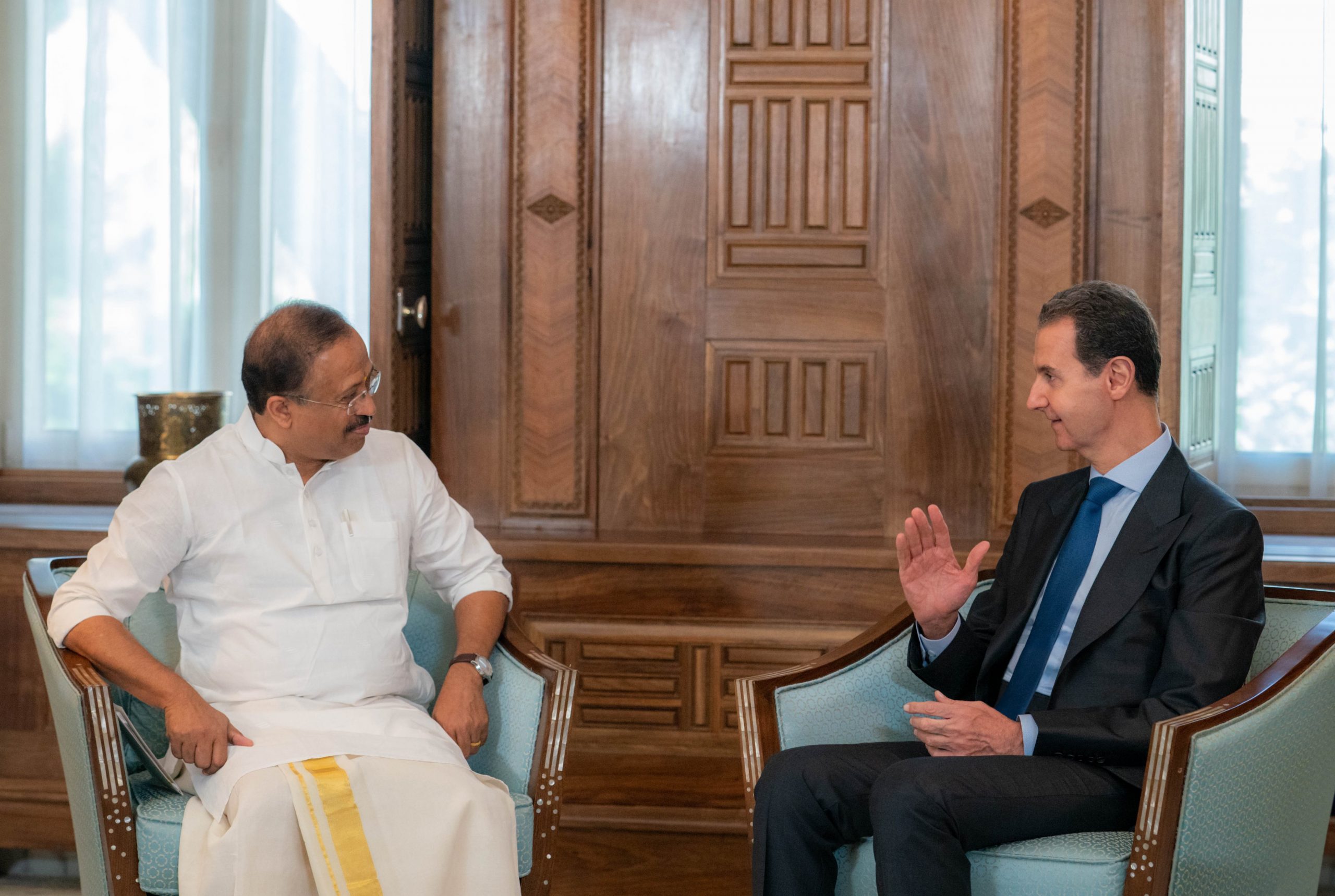

Minister of State for External Affairs V. Muraleedharan met Syrian President Bashar al-Assad in Damascus in July.
India is carefully ramping up Syria ties, reaching out the government led by President Bashar al-Assad. Minister of State for External Affairs V. Muraleedharan last month led a ministerial delegation to Damascus, the first since 2016. It was followed with 300 scholarships offered to Syrian students to pursue education in India.
Experts watching the fallout of the Arab Spring conflicts in West Asia say that India’s approach towards the Assad government aligns with positions adopted by most Arab states. Among the Arab heavyweights, Saudi Arabia and UAE, have warmed up to Syria, which has returned to the fold of the Arab League.
However, New Delhi has been discreet in its engagement with Damascus, in an effort to avoid ruffling feathers in the US and Israel, Syria’s arch foe.
Since 2011, Syria has been embroiled in a civil war that almost toppled Assad from power. More than 230,000 civilians have been killed, with 14 million displaced, according to a March 2023 report by the Syrian Network for Human Rights (SNHR).
Assad’s government was on the verge of collapse in 2015, before Russian intervention in the civil war allowed his forces to gain the upper hand against various rebel factions. His appearance at this year’s Arab League summit in Jeddah, Saudi Arabia, has been considered a sign that Arab countries are accepting that Assad will maintain his grip on power and wants to normalise ties.
The development is in accordance with the China-mediated détente between Iran and Saudi Arabia. Iran is the biggest backer of Assad. In contrast, Saudi Arabia in cahoots with other Arab states and Turkey has been bolstering rebels and other militant groups that are fighting to topple the Assad government.
Meaning of India’s Recent Moves
Experts say that when India sent its minister and followed up that visit with some bilateral engagements, they were clearly directed to gain economic, geo-political and humanitarian heft for New Delhi’s diplomacy, along with keeping goodwill of friendly Arab states.
Minister of State for External Affairs V. Muraleedharan met Syrian President Bashar al-Assad in Damascus in July.
“India did not take this move until major regional players such as the UAE, Bahrain, and most recently, Saudi Arabia in the Middle East took the initiative to re-engage with Bashar Assad’s regime,” said Manjari Singh, a West Asia expert at Amity Institute of International Relations.
“This has been India’s longtime policy in the region; it does not engage with countries, especially ones ostracized by the majority, unless the regional players warm up to that country,” she added, while talking to Democracy World.
Singh said that Muraleedharan’s visit to Syria in mid-July was significant as it marked the convergence of interests aiming for better political and economic engagement, along with humanitarian support.
Following its policy of humanitarian links, India as part of its “Operation Dost” had dispatched for victims of the deadly earthquake in February.
Dr Kadira Pethiyagoda, a senior research fellow at the Geneva Centre for Security Policy, says that both Syria and India have a lot to pursue together as friends in swiftly emerging new dynamics in world relations.
“Syria is a crucial partner for India, which is looking to make a larger impact in the Middle East with security and strategic ties. It will give India further leverage in its relations with other Middle East states, as well as with the US and West more broadly,” he said.
Pethiyagoda said the countries both have colonial experience, a secular, nationalist and developmental orientation, similar perceptions on many international and regional issues and are both members of the Non-Aligned Movement.
“The latter two similarities were of importance during the Cold War and are again important during the New Cold War and emergence of a multipolar world order,” he said.
Singh agreed with this assertion and said that India-Syria relations are based on reciprocation and are guided by “realpolitik,” with both countries supporting the other in international forums and in contentious geopolitical issues.
She said that India can help streamline investment not only in Syria but in the entire Levant region. ‘India is aiming to invest heavily in its global value chains by building an India-Gulf-Suez Canal-Mediterranean/Levant-Europe corridor with some of the partnering countries in the region,” Singh said.
“India’s investments will not only help Syria in infrastructural development but will also help it to participate in New Delhi’s global value chains. Another aspect is that the geostrategic location of Syria provides it a unique opportunity to raise its stakes in Indian investments,” she added.
In a groundbreaking study, researchers from McGill University have identified nine biological markers in the…
India, in a firm and unequivocal statement at the United Nations Security Council (UNSC), accused…
External Affairs Minister S Jaishankar shared his remarks on how India and Germany can upgrade…
Germany has come out resolutely behind India and its fight against terrorism under Operation Sindoor.…
Baloch leader Mehran Marri has accused Pakistan of unlawfully occupying Balochistan since 1948, transforming the…
The Trump administration announced on Wednesday that it will continue its efforts to prevent advanced…